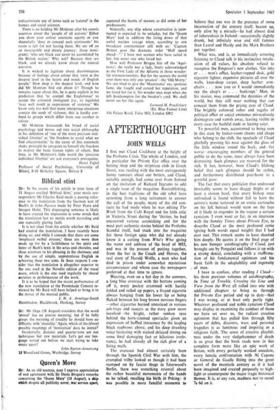AFTERTHOUGHT
JOHN WELLS
I first met Claud Cockburn at the height of the Profumo Crisis. The whole of London, and in particular the Private Eye office over the betting shop and the striptease club in Greek Street, was rustling with the most outrageously funny rumours about our betters, and Claud, suitably enough, had come over from Ireland on the invitation of Richard Ingrams to edit a single issue of the magazine. Reestablishing, in the best traditions of the old rebel hero returning from a long retirement to answer the call of the people, many of the old con- tacts he had made when he was editing The Week from the Café Royal and the little attic in Victoria Street during the 'thirties, he had uncovered various astonishing and for the most part authentic stories behind the Profuhio Scandal itself, had stuck into the magazine for those foreign spies who did not already know it a cutting from Who's Who giving the name and address of the head of MI5, and was in the process of putting together, from the bar in the Coach and Horses, the real story of Harold Wolfe, a man who had died in prison under somewhat mysterious circumstances and whose case the newspapers preferred at that time to ignore.
Wearing, even on a hot day in the summer, a long blue overcoat with the buttons coming off it, every pocket crammed with hastily folded and rolled up papers, a frayed cigarette always hanging from his lower lip or being flicked between his long brown nervous fingers —other cigarettes burned unnoticed in various ash-trays and saucers as the story grew more involved—the bright, rather sunken eyes behind the horn-rimmed spectacles given an expression of baffled innocence by the leaping black eyebrows above, and his deep drawling voice hesitating with wicked delayed timing on some final damaging fact or hilarious irrele- vancy, he had already all the rich glow of a living myth.
The overcoat had almost certainly been through the Spanish Civil War with him, the crumpled trilby looked as though it had been stamped on by fascist thugs in Isherwood's Berlin, there was something oriental about the rather beautiful movements of the hands as he talked, recalling his birth in Peking: it was possible in more fanciful moments to
believe that one was in the presence of some incarnation of the century itself, beaten up, only alive by a miracle—he had almost died of tuberculoSis in Ireland—occasionally slightly drunk, but infinitely wise and still funnier than Laurel and Hardy and the Marx Brothers put together.
What was, and is, so immediately arresting listening to Claud talk is his instinctive revalu- ation of all values, his absolute refusal to recognise the Emperor's new clothes. 'Go into er . . . man's office, leather-topped desk, gold cigarette lighter, expensive pictures all over the walls, knee-deep carpet, deep leather arm- chairs . . . now you or I would immediately say the chap's er . . . bankrupt.' Men, in his stories, may command the destinies of the world, but they still wear nothing that can conceal them from the prying eyes of Claud. The brightly coloured robes and regalia of political office or social eminence miraculously disintegrate and vanish away, leaving visible in every case the bashful nude or leering satyr.
To powerful men, accustomed to being seen in this state by locker-room chums and chaps Who belong to the club, the spectacle of Claud gleefully pressing his nose against the glass of the little window round the back, and—far worse—encouraging members of the general public to do the same, must always have been distressing. Such glimpses are reserved for the rich. It has, however, been Claud's lifelong belief that such glimpses should be stolen, and furthermore distributed post-haste to a grateful poor.
The fact that every politician thus undressed inevitably seems to have shaggy thighs or at least a cloven hoof, that every bishop once unfrocked is found without fail to have the actress's name tattooed in an erotic cartouche on his left buttock would seem on the face of it likely to engender in the voyeur a certain cynicism.- I even went so far, in an interview with the Sunday Times about Private Eye, to describe Claud as the most profound cynic (giving both words equal weight) that I had ever met. This remark seems to have- shocked him deeply. He quotes it on the final page of his new bumper autobiography (I Claud, just brought out by Penguin) and follows it up with a_ strong denial, concluding with a reaffirma- tion of his fundamental optimism and his basic faith in the adaptability and ingenuity of man.
I have to confess, after reading I Claud— his three previous volumes of autobiography, in Time of Trouble, Crossing the Line and View from the West all rolled into one with additional chapters to bring us through the Private Eye period and up to date—that I was wrong, or at least only partly right. Whatever profound and noble cynicism Claud may display in examining the conduct of those we have set over us, the radiant -creative optimism that has pulled him through fifty years of debts, disasters, wars and personal tragedies is as luminous and inspiring as a religious faith. The sense of creative playful- ness under the very sledgehammer of death is so great that the book reads now in this complete form more like an epic work of fiction, with every perfectly worked anecdote, every lunatic cOnfrontation with Al Capone or General de Gaulle fitting into the great novel of the twentieth century as if it had been imagined and -created purposely to high- light or counterpoint the major tragic historical themes. It is, at any rate, madness not to spend 17s 6d on it.






























 Previous page
Previous page